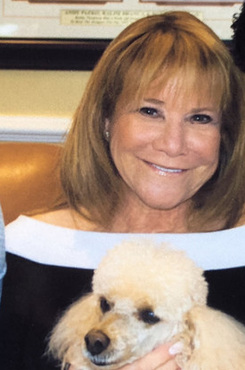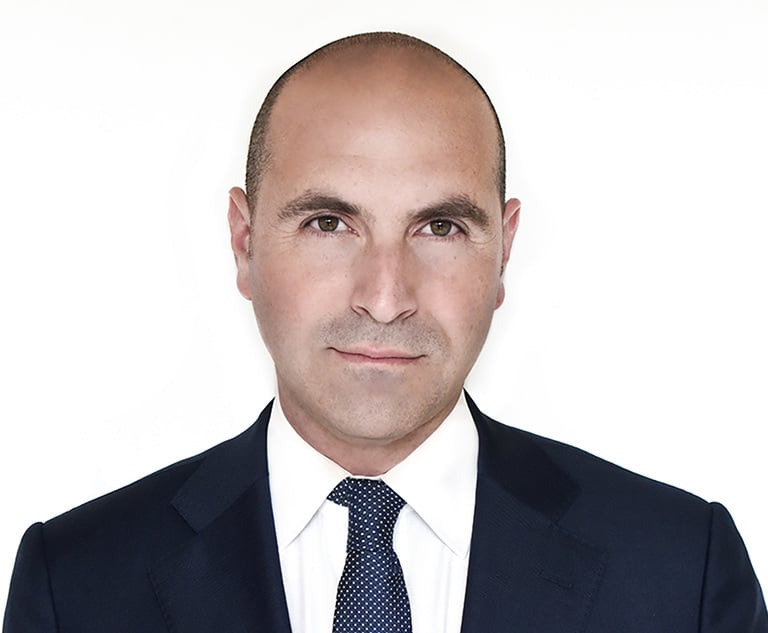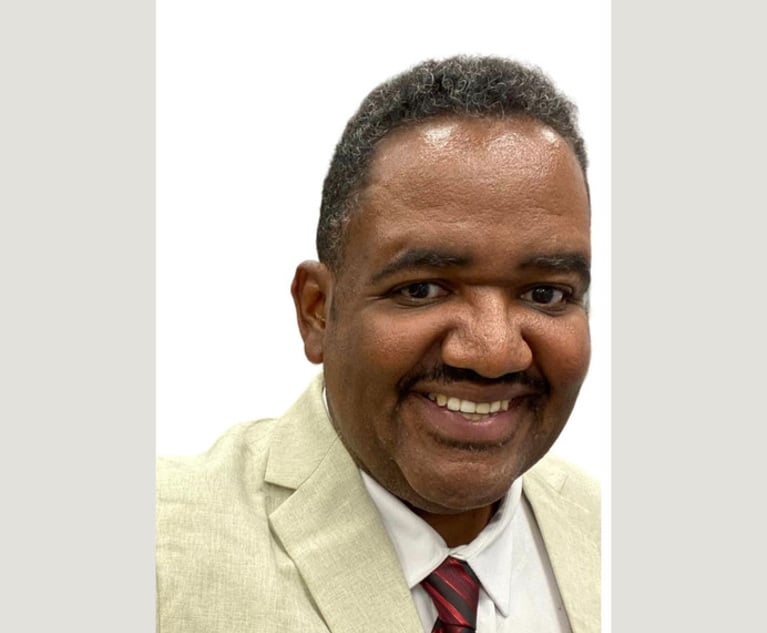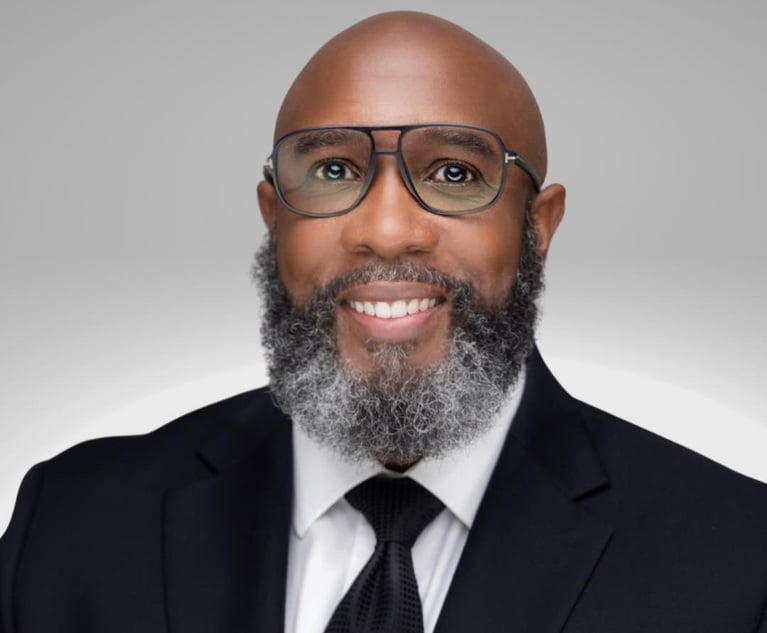How a Teenage Scrape With Cops Galvanized Jayne Weintraub's Career as Criminal Defense Lawyer
"From that day on, I knew that I wanted to help kids that didn't have a voice, that couldn't make a phone call, that didn't know what their rights were," said Miami criminal defense lawyer Jayne C. Weintraub of Sale & Weintraub, reflecting on a teenage run-in with the police.
December 07, 2018 at 02:43 PM
7 minute read
 Jayne Weintraub of Sale & Weintraub in Miami. Courtesy photo.
Jayne Weintraub of Sale & Weintraub in Miami. Courtesy photo.Before criminal defense lawyer Jayne C. Weintraub was knee-deep in federal investigations, high-profile jury trials, death penalty cases and Court TV appearances, she was a teenager who thought about criminal law as much as any teenager did — until she almost landed on the wrong side of it.
Weintraub, partner at Sale & Weintraub in Miami, has represented rapper Sean “Diddy” Combs and baseball star Jose Canseco, and served as a legal commentator on national media. But she was once among a group of 16-year-olds at the midnight movies who had an encounter with the police.
“It was not a fun encounter,” Weintraub said. “But a lot of things came out of it.”
It was an inconsequential event in many respects as Weintraub and her friends got to go home that night without repercussions. But in another way, it changed everything.
“From that day on, I knew that I wanted to help kids that didn't have a voice, that couldn't make a phone call, that didn't know what their rights were,” Weintraub said. “I knew that we were lucky, and I knew because of that we all had gotten a chance that perhaps some other kid might not have gotten.”
Weintraub resolved to work for that other kid, the one who's innocent until proven guilty — or at least that's how it's supposed to be.
“I never went to a midnight movie again either,” Weintraub quipped.
 Jayne Weintraub. Courtesy photo.
Jayne Weintraub. Courtesy photo.Rather than heading to the public defender's office as a law school intern, Weintraub chose the Miami-Dade state attorney's office, led by Janet Reno at the time.
“I knew that's where the discretion was,” Weintraub said. “I knew that's where I could make a difference. If I was able to use my discretion to give a kid a chance that deserved it, then I would be accomplishing my life goals.”
Another internship with Pretrial Services took Weintraub to jail at 5:30 a.m. every morning, where she'd interview people who'd been arrested the night before and verify their personal information for bond.
“That was an opportunity to see people in a different light,” Weintraub said. “I didn't see a disgusting human being who'd just committed an awful crime. I saw a gentle man who sat across from me and told me how I could call his wife or his kids.”
City on fire
The state attorney's office hired Weintraub when she graduated, and before long, Miami's racial riots began.
“The city was on fire,” Weintraub said.
The riots claimed 18 lives, injured 400 and cost $100 million, according to news reports. Weintraub's responsibilities quickly shifted from handling misdemeanors to trying murder cases every week.
“In those days the morale was really high in the office,” Weintraub said. “We'd stay until 8 p.m., ordering pizza and helping each other on our cases.”
Weintraub filed one of her most significant cases by accident, when a woman came to the sex battery unit claiming she was raped by her husband.
“She'd been tied up, she had bruises, she had stitches in her head from the night before. This woman had been raped. So I filed the case,” Weintraub said. “It really didn't even hit me what I had just done until I was called in by Ms. Reno, who said, 'What have you done?' ”
At the time, a husband could not legally rape his wife under Florida law. Weintraub pushed forward and made history, landing a conviction that changed Florida's spousal rape laws.
Then, as Weintraub puts it, “ it was time to go.”
'Nervous Nellie'
As a criminal defense attorney, Weintraub spent the next segment of her career peppering her office wall with framed verdict forms and garnering a fearsome reputation for tenacious trial prep and masterful cross-examinations.
The first case Weintraub defended was also the most nerve-wracking. It was a federal drug trial with seven defendants, spanning six weeks. Weintraub's client faced a mandatory jail sentence, but she didn't want to see him go to jail.
“After the trial, he came right to my office and went to sleep on the couch,” Weintraub said. “Me? I was a Nervous Nellie.”
Weintraub's colleagues had warned her the client would likely be convicted and advised her to confiscate his belt, wallet and personal items before he was taken into custody.
“I started to cry. Here I am, this tough lawyer who did all the cross-examinations for two days, here I am crying and the client is consoling me. It was the most ridiculous thing,” Weintraub said. “But P.S. it was my first acquittal, so I got to give him his wallet back.”
The same client sent Weintraub 25 roses this year, one for each year since his acquittal.
 Jayne Weintraub (Third from left) with the Women of Tomorrow Group, mentoring at risk high school girls. Courtesy photo.
Jayne Weintraub (Third from left) with the Women of Tomorrow Group, mentoring at risk high school girls. Courtesy photo.Weintraub also works with Women of Tomorrow, a mentoring program for at-risk girls throughout public high schools in South Florida. Weintraub rewrote the curriculum, inventing activities like “actions and consequences in law,” which teaches teens how to avoid legal trouble.
“I talk to them like I talk to my kids: 'You think you wont get in trouble? Well, let me tell you what crimes were just committed at that party. You think the cops can't come in? Well, let me tell you why they can. Let me tell you how to avoid that.'” Weintraub said. “I just want them to know. I want them to have the benefit of everything, to have a clean start, to be proud of themselves.”
Weintraub mentors at Krop High School — the same one 17-year-old Trayvon Martin attended before he was shot. When Weintraub defended George Zimmerman in a domestic violence case, after he'd been acquitted of Trayvon's murder, she had to run it by her 25 students first.
 Jayne Weintraub and her husband Jon Sale. Courtesy photo.
Jayne Weintraub and her husband Jon Sale. Courtesy photo.“They were curious more than objecting,” Weintraub said. “But I wanted to know how they felt about it. And if they weren't OK with it I wanted to know why and be able to explain that everyone's entitled to a lawyer.”
Weintraub practices with her husband, Jon A. Sale, who served as an assistant special Watergate prosecutor and chief assistant U.S. attorney in the Southern District of Florida. The pair met when Sale was a professor at Nova Southeastern University, then re-met as lawyers in the state attorney's office.
Sale and Weintraub married 30 years ago and have two sons who, according to Weintraub, are “better than a not guilty verdict.”
Jayne C. Weintraub
Born: September 1955, New York
Spouse: Jon Sale
Children: Michael Sale, (Jaclyn Greenblatt Sale), Jordan Sale,
Education: Florida International University, B.A., 1975; Nova Southeastern University Shepard Broad College of Law, J.D., 1980.
Experience: Of counsel, Nelson, Mullins, Broad and Cassel, 2011-present; Partner, Sale & Weintraub, 2007-present; Owner, Law Offices of Jayne Weintraub, 1987-2007; Partner, Dechovitz & Weintraub, 1986; Assistant State Attorney, Miami-Dade State Attorney's Office, 1981-1984.
More attorney profile stories:
No Dodgy Deals: Meet Jose Arrojo, Miami-Dade's New Ethics Commission Director
'Star Trek' and Separations: Attorney Cynthia Greene's Bold Journey Into Family Law
Art, Cars, Parrots and Other Spoils of Miami Fraud Lawyer Edward H. Davis
This content has been archived. It is available through our partners, LexisNexis® and Bloomberg Law.
To view this content, please continue to their sites.
Not a Lexis Subscriber?
Subscribe Now
Not a Bloomberg Law Subscriber?
Subscribe Now
NOT FOR REPRINT
© 2025 ALM Global, LLC, All Rights Reserved. Request academic re-use from www.copyright.com. All other uses, submit a request to [email protected]. For more information visit Asset & Logo Licensing.
You Might Like
View All
Growing Referral Network, Alternative Fees Have This Ex-Big Law’s Atty’s Bankruptcy Practice Soaring
5 minute read
Against the Odds: Voters Elect Woody Clermont to the Broward Judicial Bench
4 minute read
Miami Civil Judge Myriam Lehr to Say Goodbye to the County Court Bench
4 minute readTrending Stories
- 1Data Disposition—Conquering the Seemingly Unscalable Mountain
- 2Who Are the Judges Assigned to Challenges to Trump’s Birthright Citizenship Order?
- 3Litigators of the Week: A Directed Verdict Win for Cisco in a West Texas Patent Case
- 4Litigator of the Week Runners-Up and Shout-Outs
- 5Womble Bond Becomes First Firm in UK to Roll Out AI Tool Firmwide
Who Got The Work
J. Brugh Lower of Gibbons has entered an appearance for industrial equipment supplier Devco Corporation in a pending trademark infringement lawsuit. The suit, accusing the defendant of selling knock-off Graco products, was filed Dec. 18 in New Jersey District Court by Rivkin Radler on behalf of Graco Inc. and Graco Minnesota. The case, assigned to U.S. District Judge Zahid N. Quraishi, is 3:24-cv-11294, Graco Inc. et al v. Devco Corporation.
Who Got The Work
Rebecca Maller-Stein and Kent A. Yalowitz of Arnold & Porter Kaye Scholer have entered their appearances for Hanaco Venture Capital and its executives, Lior Prosor and David Frankel, in a pending securities lawsuit. The action, filed on Dec. 24 in New York Southern District Court by Zell, Aron & Co. on behalf of Goldeneye Advisors, accuses the defendants of negligently and fraudulently managing the plaintiff's $1 million investment. The case, assigned to U.S. District Judge Vernon S. Broderick, is 1:24-cv-09918, Goldeneye Advisors, LLC v. Hanaco Venture Capital, Ltd. et al.
Who Got The Work
Attorneys from A&O Shearman has stepped in as defense counsel for Toronto-Dominion Bank and other defendants in a pending securities class action. The suit, filed Dec. 11 in New York Southern District Court by Bleichmar Fonti & Auld, accuses the defendants of concealing the bank's 'pervasive' deficiencies in regards to its compliance with the Bank Secrecy Act and the quality of its anti-money laundering controls. The case, assigned to U.S. District Judge Arun Subramanian, is 1:24-cv-09445, Gonzalez v. The Toronto-Dominion Bank et al.
Who Got The Work
Crown Castle International, a Pennsylvania company providing shared communications infrastructure, has turned to Luke D. Wolf of Gordon Rees Scully Mansukhani to fend off a pending breach-of-contract lawsuit. The court action, filed Nov. 25 in Michigan Eastern District Court by Hooper Hathaway PC on behalf of The Town Residences LLC, accuses Crown Castle of failing to transfer approximately $30,000 in utility payments from T-Mobile in breach of a roof-top lease and assignment agreement. The case, assigned to U.S. District Judge Susan K. Declercq, is 2:24-cv-13131, The Town Residences LLC v. T-Mobile US, Inc. et al.
Who Got The Work
Wilfred P. Coronato and Daniel M. Schwartz of McCarter & English have stepped in as defense counsel to Electrolux Home Products Inc. in a pending product liability lawsuit. The court action, filed Nov. 26 in New York Eastern District Court by Poulos Lopiccolo PC and Nagel Rice LLP on behalf of David Stern, alleges that the defendant's refrigerators’ drawers and shelving repeatedly break and fall apart within months after purchase. The case, assigned to U.S. District Judge Joan M. Azrack, is 2:24-cv-08204, Stern v. Electrolux Home Products, Inc.
Featured Firms
Law Offices of Gary Martin Hays & Associates, P.C.
(470) 294-1674
Law Offices of Mark E. Salomone
(857) 444-6468
Smith & Hassler
(713) 739-1250







